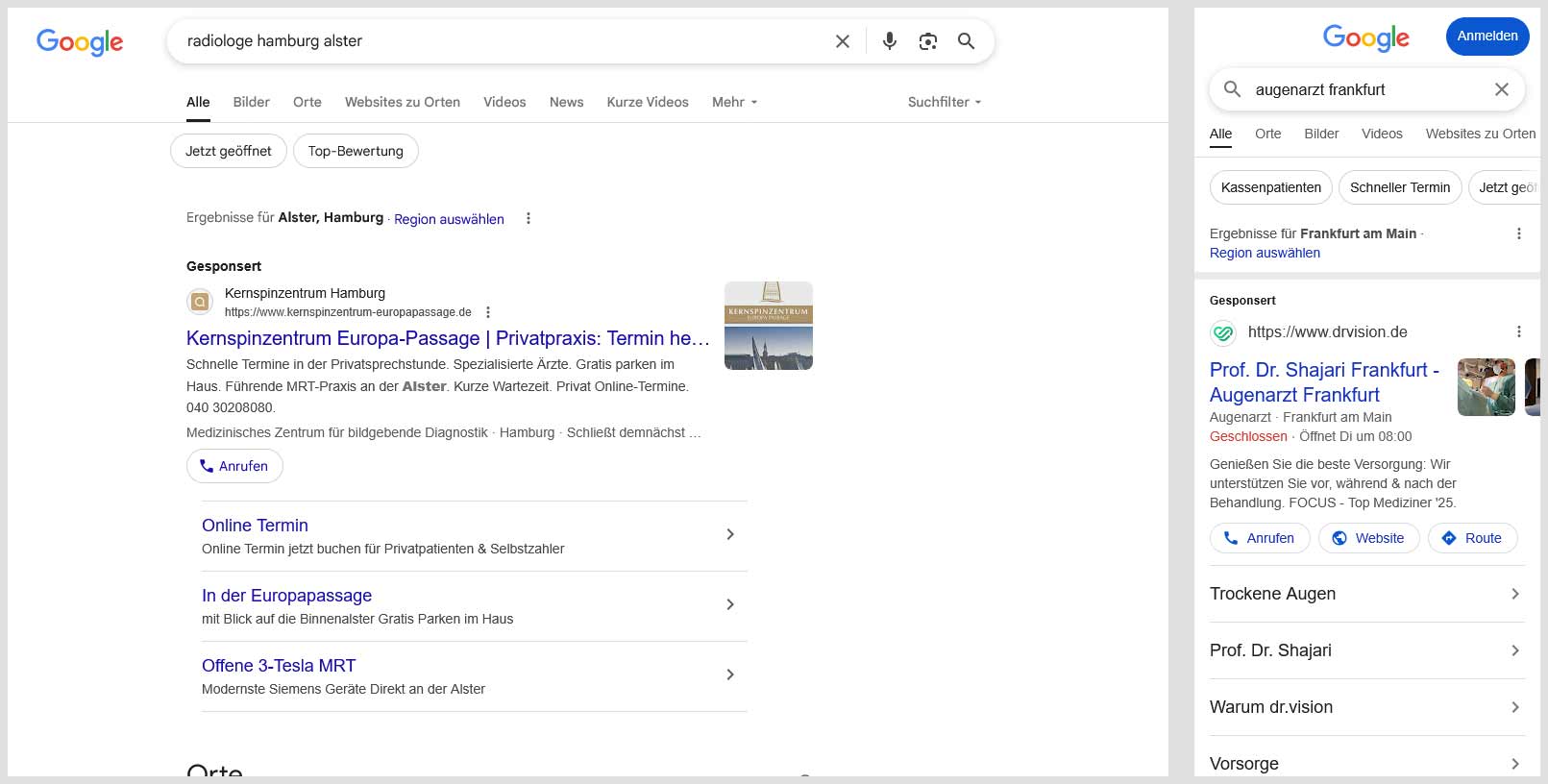Patients search differently today – not in phone books, but on search engines. And in about 90% of cases, that means Google. Whether it’s a dermatologist, dentist, or pediatrician, most journeys to a new practice start with a Google search. That’s where search engine advertising for doctors comes in. Done right, it helps attract new patients and promote your services effectively. You can even use Google Ads to recruit qualified medical staff.
What are people actually searching for?
Search queries reveal what people truly need – and how specific they already are. Someone who types “pediatrician north london” likely has a clear intent and expects proximity, availability, and expertise. Others may simply search for “family doctor near me” or “dentist” – here too, location and first impressions matter.
Your campaign should reflect these different levels of intent. Some patients want an appointment ASAP, while others are searching for a specific service or specialist. With Google Ads, you can reach both – as long as your ad hits the right tone and leads to a relevant landing page.
What is search engine advertising – and why is Google Ads so important?
Search engine advertising means paying for ads that show above, within, or below the organic Google search results – right when someone is actively searching for a doctor, a specific treatment, or a health concern. The most popular platform for this is Google Ads.

Unlike traditional advertising, you’re only reaching people who are actively looking – with a clear need. You can choose exactly which search terms trigger your ad (e.g., “emergency dentist Chicago”) and where it appears – from specific zip codes to entire regions.
Why Google Ads? Because Google holds over 90% market share in many countries. While Bing and others exist, most searches for healthcare providers happen on Google. If you want visibility, Google Ads is the way to go.
Key advantages at a glance:
- Visibility at the right moment: Your ad appears when potential patients are actively looking for your specialty or services.
- Precise location targeting: Ideal for local practices – you decide where your ad shows.
- Cost control: You set a budget and only pay when someone actually clicks.
- Measurable results: Conversion tracking shows how many appointments or inquiries your ads generate.
And it’s not just for patient acquisition – Google Ads is also a valuable tool for recruiting medical staff, especially when job platforms aren’t delivering results.
Curious whether search engine advertising is right for your practice – and what potential patients are actually searching for? Get your personal, no-obligation potential analysis today.
What determines the success of search engine advertising for doctors?
Precise targeting
Use specific keywords + geo-targeting. Add negative keywords like “free,” “internship,” or irrelevant cities to reduce wasted spend. This ensures your budget only goes toward relevant searches.
Clear, honest messaging
Be transparent – about insurance acceptance, wait times, specialties. Clarity builds trust (“Same-day appointments for private patients”) more than overpromising.
Differentiation
Highlight what sets you apart: modern equipment, accessibility, outstanding reviews. Use call extensions, location info, and star ratings (Seller Ratings) to add value right in the ad.
The right landing page
The ad gets the click – the page gets the appointment. Use focused landing pages that load fast, are mobile-optimized, and highlight one service or target audience. Always include online booking tools.
Track, analyze, optimize
Track all conversions: online bookings, calls, forms – even email inquiries via dynamic addresses. Import offline conversions (e.g., actual appointments) from your practice software into Google Ads to see which clicks turned into real patients.
Synergy with your Google Business Profile
Updated hours, photos, reviews, and a “Book Appointment” button in your Business Profile not only improve local SEO but also increase your ad’s relevance and performance.
Additional considerations
- Legal compliance: No misleading claims, no promises of cures. Refer to Google’s Healthcare & Medicines Policy.
- Privacy & tracking: Ensure GDPR compliance. Cookie-free tools like Matomo with EU-based servers are a solid choice.
DIY Google Ads – or better leave it to the pros?
Google Ads might seem simple – just pick some keywords and write a short ad. But in practice, a lack of experience can be costly. Google’s system is based on algorithms, quality scores, and real-time auctions. Without proper knowledge, you may end up paying for clicks that don’t lead to patients.
A professional agency ensures your budget is used wisely – with a clear strategy, precise targeting, and ongoing optimization. That turns search engine advertising into a real asset for your practice and helps you get the most out of your investment.
Other options: Bing Ads & SEO
- Bing Ads: Less reach than Google but often significantly cheaper. Especially in competitive specialties, it’s worth testing as an additional channel.
- SEO: Once you know which keywords convert via Google Ads, you can invest in organic rankings. It takes time and effort – but builds sustainable, free visibility. Bonus: solid SEO also boosts your presence in AI-driven systems like ChatGPT or Bing Chat.
Conclusion: Search engine advertising works – if done right
Search engine advertising is a key pillar of digital success for modern practices. Targeted campaigns, measurable results, and honest messaging don’t just bring clicks – they build trust. And that’s what leads to more appointments, more patients, and a stronger online presence in the long run.
Need expert support?
We’re an experienced Google Ads agency based in Vienna, helping doctors and medical professionals reach the right patients – with strategic campaigns, privacy-compliant tracking, and continuous optimization. Email us at campaigns@searchads.agency or learn more on this page.